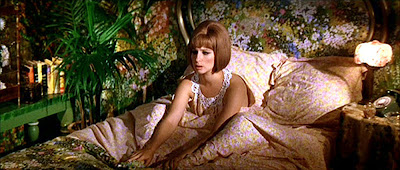 TEEN WITCH opens with a dream sequence. Dowdy teen Robyn Lively dances on the ledge of a rooftop with hunky Dan Gauthier, the high school quarterback she has a crush on. You can tell it's a dream because 1.) He's paying attention to her, and 2.) She isn't dressed like a librarian. When she's awake, Lively is frumpy and only has one friend (played by Mandy Ingber), whom she obviously chose because Ingber is even dowdier and frumpier. Even Lively’s ghoulish little brother, Joshua Miller, doesn't respect her -- and he looks like Rosie O'Donnell!
TEEN WITCH opens with a dream sequence. Dowdy teen Robyn Lively dances on the ledge of a rooftop with hunky Dan Gauthier, the high school quarterback she has a crush on. You can tell it's a dream because 1.) He's paying attention to her, and 2.) She isn't dressed like a librarian. When she's awake, Lively is frumpy and only has one friend (played by Mandy Ingber), whom she obviously chose because Ingber is even dowdier and frumpier. Even Lively’s ghoulish little brother, Joshua Miller, doesn't respect her -- and he looks like Rosie O'Donnell!Things are very strange at the high school Lively attends. There's a trio of white boys rapping in the hallway – all the time! And in the locker room, there's a squad of girls in purple leotards who break into a spontaneous, overly choreographed musical number called "I Like Boys." (Which defies description entirely, but turns out to be the best of all the unexplainable musical numbers that just show up in Teen Witch for no apparent reason.)
A few days before her 16th birthday, Lively stumbles upon the lair of diminutive fortune teller Zelda Rubinstein who tells Lively that her magical powers will emerge the day she turns 16. Sure enough, at the school dance, gazing at Gauthier and his stuck-up, cheerleader girlfriend Lisa Fuller, Lively wishes that he would come over and talk to her - and he does. Later on, as Lively is being driven home by Fuller's nerd-cousin Dan Carter, Carter starts to get handsy, and she wishes he'd leave her alone. Suddenly Carter vanishes into thin air - never to be seen again - and nobody even misses him!
Now, cognizant of her mighty powers, Lively's thoughts naturally turn to sex. Is it possible to cast a spell on Gauthier to make him love her, she asks Rubinstein . "Love you?" she replies. "With me being your coach he's gonna become your love slave!" (Just what every sixteen year old girl needs.)
Abondoning the love-slave idea, Lively opts instead to make herself the most popular girl in school. (Why settle for one guy when you can have the whole school?). Hocus Pocus and whammo! – her hairstyle, clothing, and makeup are suddenly 1989 fashionable and everyone just adores her.
Filled with lust over Lively's new look, (ah...the fatal lure of the scrunchie), Gauthier takes her to an abandoned, ramshackle house in a secluded meadow to have sex. But, as he scatters his discarded clothes like rose petals on the stairs, (in a reversal of the typical movie seduction roles), we defy anyone not to ROFL at his soft-focus International Male-style poses as the unironic sax solo plays in the background..
 On the way home, Gauthier asks Lively to the dance (Yes... another school dance.) But Lively feels guilty about tricking him into loving her so she tells him to get lost, opting instead to attend with Rubinstein, violating the first cardinal rule of dating – never go to the prom with your psychic.
On the way home, Gauthier asks Lively to the dance (Yes... another school dance.) But Lively feels guilty about tricking him into loving her so she tells him to get lost, opting instead to attend with Rubinstein, violating the first cardinal rule of dating – never go to the prom with your psychic.Teen Witch only played in about two theaters for about a day or so back in 1989, but due to relentless repeated showings throughout the next couple of decades on cable, it has bewitched an entire generation of young girls with its positive message that no matter how unpopular you are, you can always call upon the black arts to force people to love you. And isn't that what life's really all about?

















